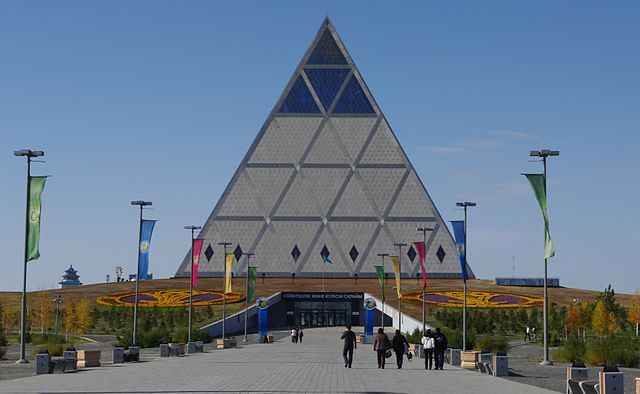
File:Palace of Peace and Reconciliation, Astana.jpg

Size of this preview: 640 × 394 pixels.
| |
This is a file from the Wikimedia Commons. Information from its description page there is shown below.
Commons is a freely licensed media file repository. You can help. |
| Description |
English: The pyramid in Astana (Kazakhstan) is called the Palace of Peace and Reconciliation. It was designed by the British architect Sir Norman Foster and opened in September 2006.
|
| Date | 15 October 2011, 13:31 |
| Source | Astana's Pyramid |
| Author | Ken and Nyetta |
|
Camera location |
51° 7′ 35.02″ N, 71° 27′ 52.89″ E |
This and other images at their locations on: Google Maps - Google Earth - OpenStreetMap | ( Info)51.126394;71.464691 |
|---|
Licensing
| This file is licensed under the Creative Commons Attribution 2.0 Generic license. | ||
http://creativecommons.org/licenses/by/2.0 CC-BY-2.0 Creative Commons Attribution 2.0 truetrue |
| This image was originally posted to Flickr by Ken and Nyetta at http://flickr.com/photos/71279764@N00/6245924097. It was reviewed on 27 October 2011 by the FlickreviewR robot and was confirmed to be licensed under the terms of the cc-by-2.0. |
File usage
The following pages on Schools Wikipedia link to this image (list may be incomplete):
Metadata
This file contains additional information, probably added from the digital camera or scanner used to create or digitize it. If the file has been modified from its original state, some details may not fully reflect the modified file.
| Camera manufacturer | PENTAX |
|---|---|
| Camera model | PENTAX K-x |
| Author | Ken Fairfax |
| Copyright holder | Kenneth Fairfax |
| Exposure time | 1/180 sec (0.0055555555555556) |
| F-number | f/13 |
| ISO speed rating | 200 |
| Date and time of data generation | 13:31, 15 October 2011 |
| Lens focal length | 37.5 mm |
| Image title | The pyramid is actually called the Palace of Peach and Reconcillation. It was designed by the British architect Sir Norman Foster and opened in September 2006. It contains areas for a number of religions, including Judaism, Islam, Christianity, Buddhism, Hinduism, Taoism and other faiths. It also houses a 1,500- seat opera house, a national museum of culture, a new “university of civilization”, a library and a research centre for Kazakhstan’s ethnic and geographical groups. |
| Orientation | Normal |
| Horizontal resolution | 0 dpi |
| Vertical resolution | 24.960741770022 dpi |
| Software used | Corel Photo Album 6 |
| File change date and time | 18:54, 15 October 2011 |
| Y and C positioning | Co-sited |
| Exposure Program | Landscape mode (for landscape photos with the background in focus) |
| Exif version | 2.2 |
| Date and time of digitizing | 13:31, 15 October 2011 |
| Meaning of each component |
|
| Exposure bias | 0 |
| Metering mode | Pattern |
| Flash | Flash did not fire, compulsory flash suppression |
| Supported Flashpix version | 0,100 |
| Colour space | sRGB |
| Sensing method | One-chip colour area sensor |
| File source | Digital still camera |
| Scene type | A directly photographed image |
| Custom image processing | Normal process |
| Exposure mode | Auto exposure |
| White balance | Auto white balance |
| Focal length in 35 mm film | 57 mm |
| Scene capture type | Landscape |
| Contrast | Hard |
| Saturation | Normal |
| Sharpness | Hard |
| Subject distance range | Distant view |
| Unique image ID | 744BE500891B4CB7A4479E4FBF7A47BB |
| IIM version | 2 |
| Headline | Astana's Pyramid |
Find out about Schools Wikipedia
All five editions of Schools Wikipedia were compiled by SOS Children's Villages. Thanks to SOS Children's Villages, 62,000 children are enjoying a happy childhood, with a healthy, prosperous future ahead of them. Sponsoring a child is a great way to help children who need your support.
